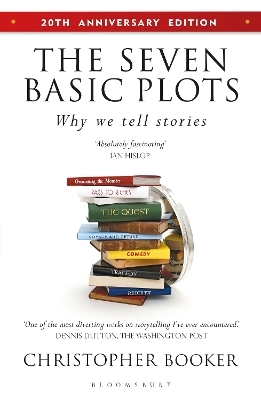
The Seven Basic Plots
Bloomsbury Continuum (Verlag)
978-1-3994-1592-7 (ISBN)
This remarkable and monumental book at last provides a comprehensive answer to the age-old riddle of whether there are only a small number of 'basic stories' in the world.
Using a wealth of examples, from ancient myths and folk tales via the plays and novels of great literature to the popular movies and TV soap operas of today, it shows that there are seven archetypal themes which recur throughout every kind of storytelling. But this is only the prelude to an investigation into how and why we are 'programmed' to imagine stories in these ways, and how they relate to the inmost patterns of human psychology.
Drawing on a vast array of examples, from Proust to detective stories, from the Marquis de Sade to E.T., Christopher Booker then leads us through the extraordinary changes in the nature of storytelling over the past 200 years, and why so many stories have 'lost the plot' by losing touch with their underlying archetypal purpose.
Booker analyses why evolution has given us the need to tell stories and illustrates how storytelling has provided a uniquely revealing mirror to mankind's psychological development over the past 5000 years. This seminal book opens up in an entirely new way our understanding of the real purpose storytelling plays in our lives, and will be a talking point for years to come.
Christopher Booker was a founding editor of Private Eye, to which he regularly contributed, and also wrote a longstanding column for the Sunday Telegraph. His bestselling books include The Seven Basic Plots: Why We Tell Stories, The Real Global Warming Disaster, The Great Deception, The Mad Officials, Scared to Death and The Neophiliacs. Booker died in July 2019.
Introduction and historical notes
PART ONE: THE SEVEN GATEWAYS TO THE UNDERWORLD
1 Overcoming the Monster
2 The Monster (II) and the Thrilling Escape from Death
3 Rages to Riches
4 The Quest
5 Voyage and Return
6 Comedy
7 Comedy (II): The Plot Disguised
8 Tragedy (I): The Five Stages
9 Tragedy (II): The Divided Self
10 Tragedy (III): The Hero as Monster
11 Rebirth
12 The Dark Power: From Shadow into Light
Epilogue to Part One: The Rule of Three (the role played in stories by numbers)
PART TWO: THE COMPLETE HAPPY ENDING
Prologue to Part Two
13 The Dark Figures
14 Seeing Whole: The Feminine and Masculine Values
15 The Perfect Balance
16 The Unrealised Value
17 The Archetypal Family Drama (Continued)
18 The Light Figures
19 Reaching the Goal
20 The Fatal Flaw
PART THREE: MISSING THE MARK
21 The Ego Takes Over (I): Enter the Dark Inversion
22 The Ego Takes Over (II): The Dark and Sentimental Versions
23 The Ego Takes Over (III): Quest, Voyage and Return, Comedy
24 The Ego Takes Over (IV): Tragedy and Rebirth
25 Losing the Plot: Thomas Hardy - A Case History
26 Going Nowhere: The Passive Ego. The Twentieth-Century Dead End - From Chekhov to Close Encounters
27 Why Sex and Violence? The Active Ego. The Twentieth-Century Obsession: From de Sade to The Terminator
28 Rebellion Against 'The One': From Job to Nineteen Eighty-Four
29 The Mystery
30 The Riddle of the Sphinx: Oedipus and Hamlet
PART FOUR: WHY WE TELL STORIES
31 Telling Us Who We Are: Ego versus Instinct
32 Into the Real World: The Ruling Consciousness
33 Of Gods and Men: Reconnecting with 'The One'
34 The Age of Loki: The Dismantling of the Self
Epilogue: The Light and the Shadows on the Wall
Author's Personal Note
Glossary of Terms
Bibliography
Index of Stories Cited
General Index
| Erscheinungsdatum | 20.07.2024 |
|---|---|
| Vorwort | Nick Booker |
| Verlagsort | London |
| Sprache | englisch |
| Maße | 129 x 198 mm |
| Themenwelt | Geisteswissenschaften ► Sprach- / Literaturwissenschaft ► Anglistik / Amerikanistik |
| Geisteswissenschaften ► Sprach- / Literaturwissenschaft ► Literaturwissenschaft | |
| Sozialwissenschaften ► Ethnologie | |
| Sozialwissenschaften ► Soziologie | |
| ISBN-10 | 1-3994-1592-1 / 1399415921 |
| ISBN-13 | 978-1-3994-1592-7 / 9781399415927 |
| Zustand | Neuware |
| Haben Sie eine Frage zum Produkt? |
aus dem Bereich


